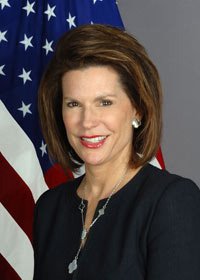WASHINGTON, (Reuters) – The world’s leading breast cancer charity, Susan G. Komen for the Cure, struggled yesterday to defuse a growing crisis over its decision to cut funding for Planned Parenthood, which provides abortion and birth control services.

The sudden rift between the two top U.S. women’s health advocacy groups triggered a furious debate on social media sites between supporters and opponents of abortion rights.
Democratic lawmakers called on Komen to reconsider its move as the organization was thrust into the center of an intractable dispute that some say will hamper its work for years to come. New York Mayor Michael Bloomberg pledged his own money to help Planned Parenthood recoup the lost funds.
Planned Parenthood had received about $700,000 annually from Komen to provide poor women with breast cancer screening, education and access to affordable mammograms.
As the outcry intensified, Komen founder Nancy Brinker took to national television and the Internet to deny the charity’s decision was the result of lobbying from anti-abortion groups.
“We will never bow to political pressure,” she said in a video posted on the Komen website.
“The scurrilous accusations being hurled at this organization are profoundly hurtful to so many of us,” said Brinker, who founded the group following her sister’s death in 1980 of breast cancer. “More importantly, they are a dangerous distraction from the work that still remains to be done in ridding the world of breast cancer.”
But philanthropy experts said it would be difficult for Komen to convince people it was not playing politics.
“There’s a long-term weakening of the Susan G. Komen brand from this decision,” said Melissa Berman, chief executive of nonprofit Rockefeller Philanthropy Advisers, which counsels wealthy donors who give more $200 million a year.
“We would see donors reluctant to be involved with a charity whose decision-making gets influenced by short-term pressures and politics because you would always wonder who is really in charge.”
The Christian Science Monitor reported that the Komen foundation nevertheless reported a 100 percent increase in donations received during the past two days, although it said no hard numbers were available. Komen representatives could not immediately be reached for comment on the report.
A Dallas-based charity, the Lee and Amy Fikes Foundation, said it was making a $250,000 donation to Planned Parenthood to allow it to continue providing breast-screening services in the absence of Komen’s support.
“Our family is saddened that the far right has relentlessly and successfully pressured (Komen) to cut funding for breast screening, referral and education support to low-income women who, until now, have been able to depend on the partnership between Komen and Planned Parenthood for their health,” the Fikes Foundation said in a statement.
The Komen foundation, known for its pink ribbon symbol and Race for the Cure fundraisers, has collected more than $1.9 billion for breast cancer research and programs. It has affiliates in more than 100 U.S. cities and 50 countries.
Komen said its decision reflected a move to eliminate duplicate grants and tighten eligibility rules. That includes barring money to groups under investigation by authorities. Planned Parenthood is the subject of a probe by U.S. Rep. Cliff Stearns, a Florida Republican who opposes abortion.





